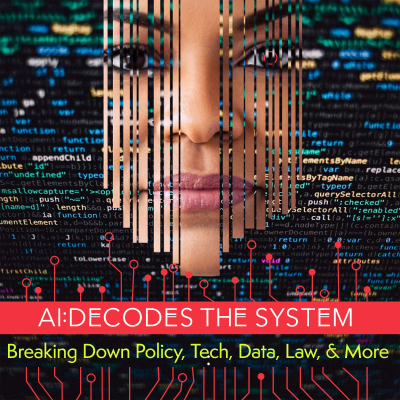
AI Decodes the System
Engels
Nieuws & Politiek
Tijdelijke aanbieding
2 maanden voor € 1
Daarna € 9,99 / maandElk moment opzegbaar.
- 20 uur luisterboeken / maand
- Podcasts die je alleen op Podimo hoort
- Gratis podcasts
Over AI Decodes the System
Join us on AI Decodes the System, hosted by Amber Ivey (or AI, for short), as we dive deep into the complex systems of data, tech, law, and public policy. Our goal is to make these topics easy to understand for everyone, regardless of their background or prior knowledge. We believe that by breaking down these systems in a clear and accessible way, we can help people better understand the important issues that shape our world. Tune in for in-depth discussions, expert insights, and plain-language explanations of the latest developments in data, tech, law, and public policy.
Alle afleveringen
30 afleveringenListen to my new “AI for Kids” podcast
Dear community, I’ve decided to pause the "AI Decodes the System" podcast to fully focus on our "AI for Kids" initiative. This new direction allows me to dedicate my efforts to helping children understand and engage with AI in a meaningful way. The two minute trailer is available here: https://aiforkids.buzzsprout.com/ [https://aiforkids.buzzsprout.com/] You can find the "AI for Kids" podcast, launching on May 28th, on your favorite podcast platforms. New episodes will be available every other Tuesday. Thank you for your continued support, and I’m excited to embark on this journey with you! Best, Amber Ivey aka AI Support the show [https://www.patreon.com/Aidecodes] Help me become the #1 (number one) podcast and podcaster for technology, public policy, data, law, and culture. Subscribe, download, and share. If you like the content, feel free to support the show by donating to my Patreon account at the link below: https://www.patreon.com/Aidecodes
Decoding Data Governance 101 with Tiankai Feng: Where Bytes Meet Beats
Welcome to AI Decodes the System [https://www.aidecodes.com/], your guide through the intricate alleys of artificial intelligence, data, policy, technology, and law. Here, we make the complex world of tech effortlessly graspable. I'm your host, Amber Ivey, but you can just call me AI. Today, we're in for a treat, fusing the worlds of data and music with the illustrious Tiankai Feng. While many recognize his accomplishments in the data governance space, there's another tune to his story: his captivating blend of data acumen and musical artistry. So, what's the buzz about this episode? * We chat about how Tiankai juggles between crunching data and dropping beats. It's a wild combo, trust me. * Ever thought data was boring? Tiankai will tell you how he spices it up with a hint of humor and a splash of rhythm. * "GOVERNORS OF DATA [https://www.youtube.com/watch?v=EdOzZJd8DNk]" isn't just another rap song; it's Tiankai's way of breaking down data governance. We dive deep into the story behind those bars. * We also get a little philosophical, chatting about the "human" touch in our data-packed lives. Spoiler: It’s heartwarming stuff. * Tiankai shares some gold about how he thinks we can talk about data without the yawns and the head-scratching. * And if you've been on the fence about diving into data, he's got some words of wisdom you won't want to miss. Alright, before I give it all away, remember to hit subscribe and let us know what you think. And hey, let’s keep the conversation going online! Social Media Tiankai Feng: LinkedIn [https://www.linkedin.com/in/tiankaifeng/], YouTube [https://www.youtube.com/@KaiFeng], and Governor's of Data [https://www.youtube.com/watch?v=EdOzZJd8DNk] AI: Decodes the System: Website [http://www.aidecodes.com/], Instagram [http://www.instagram.com/aidecodes], Twitter [http://www.twitter.com/aidecodes], Facebook [https://www.facebook.com/AIDecodes], YouTube [https://www.youtube.com/@aidecodes], and TikTok [https://vm.tiktok.com/ZMJ4rAvxT/] Support the show [https://www.patreon.com/Aidecodes] Help me become the #1 (number one) podcast and podcaster for technology, public policy, data, law, and culture. Subscribe, download, and share. If you like the content, feel free to support the show by donating to my Patreon account at the link below: https://www.patreon.com/Aidecodes
AI News of the Week - September 1, 2023
Welcome to AI Decodes the System, the podcast where we delve into the intricate worlds of data, policy, technology (artificial intelligence), and law for everyone to comprehend. I am your host, Amber Ivey, affectionately known as AI. In today's episode, we are thrilled to have a discussion with Marcy Nuelle [https://www.youtube.com/@MarcyNuelle], a brilliant researcher and renowned YouTuber, leading major faceless YouTube channels and emerging as your definitive source for AI insights. We're positioning ourselves as the go-to authorities in AI. AI News Of The Week Update. We are covering topics such as ChatGPT, PortfolioPilot, an AI-powered investment platform by Global Predictions, and more Artificial Intelligence topics. Make sure to checkout my cohost @MarcyNuelle [https://studio.youtube.com/channel/UCFvJSqurmTbGenkOuYzw5tw]for additional AI updates We are your Go To Girls for AI. #ainews #artificialintelligence #worldnews #technews #technologynews #aitools #freeaitools #chatgpt #gpt4 #gpt5 #agi #futurism #futuretech #futuretechnology #aivideo #aivideogenerator #runwayml #runwaygen2 #newaitools #bestaitools #metaai #IBMai #microsoftai #topaitools #bidenomics #ai #executiveorder #airegulation #portfoliopilot AI News Of The Week: There are a lot of updates today and we got through a lot of them with less banter. Check out the pod and let us know what you think! Don't forget to follow Marcy Neulle [https://www.youtube.com/@MarcyNuelle] and AI Decodes the System [https://www.youtube.com/@aidecodes] on YouTube, and stay tuned for more enlightening discussions on the intersection of AI, data, technology, policy, and law. Guest: Marcy Nuelle Connect with us: * AI: Decodes the System: Website [http://www.aidecodes.com/], Instagram [http://www.instagram.com/aidecodes], Twitter [http://www.twitter.com/aidecodes], Facebook [https://www.facebook.com/AIDecodes], and TikTok [https://vm.tiktok.com/ZMJ4rAvxT/] * Marcy Nuelle: YouTube Channel [https://www.youtube.com/@MarcyNuelle] Support the show: https://www.patreon.com/Aidecodes [https://www.patreon.com/Aidecodes] https://www.patreon.com/Aidecodes Support the show [https://www.patreon.com/Aidecodes] Help me become the #1 (number one) podcast and podcaster for technology, public policy, data, law, and culture. Subscribe, download, and share. If you like the content, feel free to support the show by donating to my Patreon account at the link below: https://www.patreon.com/Aidecodes
AI News of the Week - August 27, 2023
Welcome to AI Decodes the System, the podcast where we delve into the intricate worlds of data, policy, technology (artificial intelligence), and law for everyone to comprehend. I am your host, Amber Ivey, affectionately known as AI. In today's episode, we are thrilled to have a discussion with Marcy Nuelle [https://www.youtube.com/@MarcyNuelle], a brilliant researcher and renowned YouTuber, leading major faceless YouTube channels and emerging as your definitive source for AI insights. We're positioning ourselves as the go-to authorities in AI. AI News Of The Week Update. We are covering topics such as Nvidia, Microsoft, Meta, ChatGPT, Apollo robot, and dozens more Artificial Intelligence topics. Make sure to checkout my cohost @MarcyNuelle [https://studio.youtube.com/channel/UCFvJSqurmTbGenkOuYzw5tw]for additional AI updates We are your Go To Girls for AI. #ainews #artificialintelligence #worldnews #technews #technologynews #aitools #freeaitools #chatgpt #gpt4 #gpt5 #agi #futurism #futuretech #futuretechnology #aivideo #aivideogenerator #runwayml #runwaygen2 #newaitools #bestaitools #metaai #IBMai #microsoftai #topaitools #bidenomics #ai #executiveorder #airegulation AI News Of The Week: There are a lot of updates today and we got through a lot of them with less banter. Check out the pod and let us know what you think! Don't forget to follow Marcy Neulle [https://www.youtube.com/@MarcyNuelle] and AI Decodes the System [https://www.youtube.com/@aidecodes] on YouTube, and stay tuned for more enlightening discussions on the intersection of AI, data, technology, policy, and law. Guest: Marcy Nuelle Connect with us: * AI: Decodes the System: Website [http://www.aidecodes.com/], Instagram [http://www.instagram.com/aidecodes], Twitter [http://www.twitter.com/aidecodes], Facebook [https://www.facebook.com/AIDecodes], and TikTok [https://vm.tiktok.com/ZMJ4rAvxT/] * Marcy Nuelle: YouTube Channel [https://www.youtube.com/@MarcyNuelle] Support the show: https://www.patreon.com/Aidecodes [https://www.patreon.com/Aidecodes] Support the show [https://www.patreon.com/Aidecodes] Help me become the #1 (number one) podcast and podcaster for technology, public policy, data, law, and culture. Subscribe, download, and share. If you like the content, feel free to support the show by donating to my Patreon account at the link below: https://www.patreon.com/Aidecodes
AI News of the Week - August 18, 2023
Welcome to AI Decodes the System, the podcast where we delve into the intricate worlds of data, policy, technology (artificial intelligence), and law for everyone to comprehend. I am your host, Amber Ivey, affectionately known as AI. In today's episode, we are thrilled to have a discussion with Marcy Nuelle [https://www.youtube.com/@MarcyNuelle], a brilliant researcher and renowned YouTuber, leading major faceless YouTube channels and emerging as your definitive source for AI insights. We're positioning ourselves as the go-to authorities in AI. Call us the "go-to girls of AI." AI News Of The Week Update. We are covering topics such as Joe Biden AI executive order, IBM AI partnership with Microsoft AI, Meta AI & CMU Robotics, Snapchat AI Rogue Chatbots, Google AI Genesis AI Tool and dozens more Artificial Intelligence topics. Topics in order: AI News Update Biden Executive Order AI Regulations IBM AI Partners with Microsoft AI Snapchat AI Rogue Chatbot Google AI Courses Tencent AI Model Beijing AI Regulations AI Job Qualifications AirAI Tesla Customer Service Call IBM AI & U.S Open Tennis Partnership Meta AI & CMU Robotics Adobe Express AI Google AI Tools Azure AI Update OpenAI acquired Global Illumination AliBaBa AI LLM OpenAI & Associated Press Deal Google AI Genesis Tools Google DeepMind AI Life Advice Tool Elemental Cognition by David Ferrucci RunWayML AI Videos Watch Page Department of Energy AI Program Meta Code Llama FDA AI Diagnostics Tools AI Drones Building Apartments Make sure to checkout my cohost @MarcyNuelle [https://studio.youtube.com/channel/UCFvJSqurmTbGenkOuYzw5tw] for additional AI updates We are your Go To Girls for AI. #ainews #artificialintelligence #worldnews #technews #technologynews #aitools #freeaitools #chatgpt #gpt4 #gpt5 #agi #futurism #futuretech #futuretechnology #aivideo #aivideogenerator #runwayml #runwaygen2 #newaitools #bestaitools #metaai #IBMai #microsoftai #topaitools #bidenomics #ai #executiveorder #airegulation AI News Of The Week: There are a lot of updates today and we got through a lot of them with less banter. Check out the pod and let us know what you think! Don't forget to follow Marcy Neulle [https://www.youtube.com/@MarcyNuelle] and AI Decodes the System [https://www.youtube.com/@aidecodes] on YouTube, and stay tuned for more enlightening discussions on the intersection of AI, data, technology, policy, and law. Guest: Marcy Nuelle Connect with us: * AI: Decodes the System: Website [http://www.aidecodes.com/], Instagram [http://www.instagram.com/aidecodes], Twitter [http://www.twitter.com/aidecodes], Facebook [https://www.facebook.com/AIDecodes], and TikTok [https://vm.tiktok.com/ZMJ4rAvxT/] * Marcy Nuelle: YouTube Channel [https://www.youtube.com/@MarcyNuelle] Support the show: https://www.patreon.com/Aidecodes [https://www.patreon.com/Aidecodes] Support the show [https://www.patreon.com/Aidecodes] Help me become the #1 (number one) podcast and podcaster for technology, public policy, data, law, and culture. Subscribe, download, and share. If you like the content, feel free to support the show by donating to my Patreon account at the link below: https://www.patreon.com/Aidecodes
Kies je abonnement
Tijdelijke aanbieding
Premium
20 uur aan luisterboeken
Podcasts die je alleen op Podimo hoort
Gratis podcasts
Elk moment opzegbaar
2 maanden voor € 1
Daarna € 9,99 / maand
Premium Plus
Onbeperkt luisterboeken
Podcasts die je alleen op Podimo hoort
Gratis podcasts
Elk moment opzegbaar
Probeer 30 dagen gratis
Daarna € 11,99 / maand
2 maanden voor € 1. Daarna € 9,99 / maand. Elk moment opzegbaar.































